广州版小学六年级英语上册每单元要点
- 格式:doc
- 大小:425.00 KB
- 文档页数:12
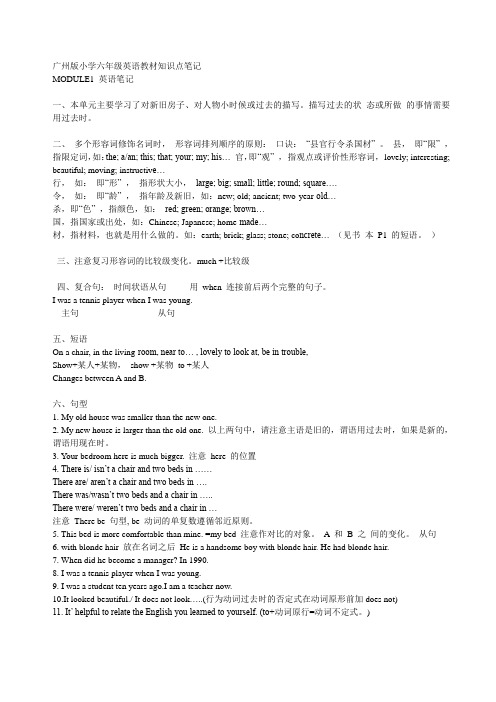
广州版小学六年级英语教材知识点笔记MODULE1 英语笔记一、本单元主要学习了对新旧房子、对人物小时候或过去的描写。
描写过去的状态或所做的事情需要用过去时。
二、多个形容词修饰名词时,形容词排列顺序的原则:口诀:“县官行令杀国材” 。
县,即“限” ,指限定词,如:the; a/an; this; that; your; my; his… 官,即“观” ,指观点或评价性形容词,lovely; interesting; beautiful; moving; instructiv e…行,如:即“形” ,指形状大小,large; big; small; little; round; square….令,如:即“龄” ,指年龄及新旧,如:new; old; ancient; two-year-old…杀,即“色” ,指颜色,如:red; green; orange; brown…国,指国家或出处,如:Chinese; Japanese; home-made…材,指材料,也就是用什么做的。
如:earth; brick; glass; stone; co ncrete… (见书本P1 的短语。
)三、注意复习形容词的比较级变化。
much +比较级四、复合句:时间状语从句--------用when 连接前后两个完整的句子。
I was a tennis player when I was young.主句从句五、短语On a chair, in the living-room, near to… , lovely to look at, be in trouble,Show+某人+某物,show +某物to +某人Changes between A and B.六、句型1. My old house was smaller than the new one.2. My new house is larger than the old one. 以上两句中,请注意主语是旧的,谓语用过去时,如果是新的,谓语用现在时。

广州版小学英语《SuccessWithEnglish》教材内容提要第一部分:句型、语法肯定句否定句一般疑问句一般现在Iam⋯Iamnot⋯AmI⋯?We/You/They We/You/They Arewe/you/theyare⋯aren’t⋯⋯?He/She/Itis⋯He/She/Itisn ’tIs⋯he/she/it ⋯?一般将来Iwillbe(am Iwon’tbe Will/Shallwe/I ⋯?goingto (amnotgoing AmIgoingtobebe)⋯tobe)⋯⋯?We/You/Theywill We/You/They Willyou/we/they/be(aregoingto won’tbe he/she/it⋯?be)⋯(aren’tgoing Willyou/we/theyHe/She/Itwillbe tobe) ⋯be⋯?(isgoingto He/She/Itwon’t Arewe/they/youBe)⋯be(isn ’tgoing goingtobe ⋯?tobe) ⋯Ishe/she/itgoingtobe?一般过去I/He/She/Itwas ⋯I/He/She/Itwasn ’t WasI/he/she/it ⋯?We/You/They ⋯Werewe/you/theywere⋯We/You/They ⋯?weren’t⋯Therebe:肯定句否定句一般疑问句一般现在Thereis/are⋯Thereisn ’t/aren ’Is/Aret...there⋯?一般将来Thereis/aregoing Thereisn ’t/aren Will’t therebe ⋯?tobe⋯goingtobe⋯AretheregoingtoTherewillbe ⋯Therewon’tbe⋯⋯?一般过去Iwas⋯I/He/She/Itwasn ’t Was/Werethere⋯?We/You/They ⋯were⋯We/You/TheyHe/She/Itwas ⋯weren’t⋯Todo(行为动词以work为例)一般现在I/We/You/TheyI/We/You/Theydon’t DoI/you/we/theywork⋯work⋯work⋯?He/She/Itworks⋯He/She/Itdoesn’t Doeshe/she/itwork⋯work⋯?现在进行时Iamworking⋯Iamnotworking AmIworking⋯?1We/You/Theyare ⋯Areyou/we/theyworking⋯We/You/Theyaren’t working⋯?He/She/Itis working⋯Ishe/she/itWorking⋯He/She/Itisn ’t working⋯?working⋯一般将来I/We/You/He/She/It I/We/You/He/She/It/They WillI/we/you//Theywillwork won’twork ⋯they/he/she/it⋯I’mnotgoingtowork ⋯work⋯?I’mgoingtowork We/You/Theyaren’t AmIgoingto⋯goingtowork ⋯work⋯?We/You/Theyare He/She/Itisn ’tgoingtoAreyou/we/theygoingtowork ⋯work⋯goingtoworkHe/She/Itisgoing ⋯?towork⋯Ishe/shegoingtowork⋯?一般过去I/We/You/They/He/ I/We/You/They/He/ DidI/we/you/they/She/Itworked ⋯She/Itdidn ’twork ⋯/he/she/itwork⋯?1.读下面的特殊疑问式的句子,你能总结一些特殊疑问句的构成的规律吗?I.Wholivesthere.Whoissingingintheroom?Whowasathomeyesterday?II.Whatdoeshedo?Whatishedoing?Whatdidtheydo?Whendoesheusuallygetup?Whendidshehavedinneryesterday?Whereishenow?Wherearetheyplantingtrees?Wheredidtheyplayfootball?Howisyourmother?Howishecoming?Howdidtheygetthere?Whydoeshegothere?Whydidshegothere?III.Whosebookisthis?Whoseparentsarecominghere?Whichbookisyours?Whichpresentsdidhegiveyou?22.关于形容词、副词的比较级和最高级(1)你知道形容词、副词的比较级和最高级构成的一些规律吗?A.一般情况下加-er,-est:long–longer,longest;small–smaller,smallestB.重读闭音节,双写最后一个字母再加-er,-est:big–bigger,biggest; hot–hotter,hottestC.辅音字母加y,改作后一个字母y为i再加-er,-est:funny–funnier,funniest, lucky–luckier,luckiestD.部分双音节和多音节词,加more,most:slowly–moreslowly,mostslowly; moredelicious,mostdeliciousE.不规则变化:good–better,best; bad–worse,worst(2)你知道形容词、副词的比较级和最高级句子的构成吗?A.Thisbookisnewerthanthatone.TheEnglishbookisthenewestofthethree.MikerunsfasterthanJohn.Mikerunsfastestinhisclass.B.Thisflowerismorebeautifulthanthatone.Thistreeistheoldestinthepark.Thegirlisswimmingbetterthanthegirl.Jimswimsbestinhisgroup.C.Snakesaremoredangerousthanfrogs.Themeetingisthemostimportant.Theoldmanwalksmoreslowlytheyoungman.Katejumpshighestinherclass.D.TimhasmorebooksthanJim.Timhasthemoststampsinhisclass.3.关于代词some-,any-,no-,every-:(1)some-多用在肯定句表示请求得到某些东西的句子:Someonewillcomehere.Wouldyoulikesomethingtoeat.(2)any-多用于疑问句或否定句:Isthereanythinginthebox?Wedon’twanttoseeanyoneofthem?(3)no-是事实的否定:Thereisnothingintheroom.Nobodycandothat.(4)代词some-,any-,no-,every-语法上看成是第三人称单数:Thereissomethinginthebottle.Everyonelikesit.3表1:小学教材各话题板块涉及的主要内容话题板主要涉主要涉及单词快及模块数字、B1M6 基数、序数、星期、数量、B3M5-6 日期、月份、季节、时间、B5M1 年份、钟点的表达、日期计量单位等购物B3M1 money,change,shopB4M4 assistant,vendor人物:年B1M2 表男女老少的类别龄、体貌B2M3 名、身体部位名、服衣着、性B3M1-4 饰名、体质与外貌形格、职业、B4M1-2 容词、性格形容词、爱好与特B5M2 职业、表特长爱好的长、理想、B8M3 动词生平B8M5学校生B4M3 科目名、作息动词、活:课B5M1 运动、娱乐动词程、作B6M1息、课B6M3外活动家庭生B2M1 家庭成员名、职业名、活:家B3M6 爱好特长动词、娱乐庭成员B4M4 形式名词及动词、家及其职B5M1 务动词、频度副词业与爱好、家务与休闲食品B4M4 食品名、三餐名、进B6M5 食动词生活习B6M2 描述体质的形容词、惯与健B6M5 描述身体感觉的形容康词、生活习惯的动词、主要涉及语法、功能等名词复数;Howmany/Howheavy/Howlong/Whattime/When 等引导的疑问句和回答等;时间、星期、日期的询问与表达;招呼与应答;表达要买某种商品或询问是否有某种商品;对商品的评论;询问价格;询问是否还需其他商品及应答;找零描述体质外貌的各种句式:be+adj,has/have+n,with+n,in+n 的用法表示爱好与特长的句式: likesth/doingsth,begood/badat⋯,do(es)⋯well;描述爱好与行为习惯等的一般现在时:Hereadsalot.HewatchesTVveryoften等;表示职业、愿望的句式:be+jobs;Iwanttobea⋯whenIgrowup.IhopeIcan⋯叙述生平的句式:beborn⋯一般现在时的各种句式一般现在时的各种句式;询问与表达频度;谈论对娱乐节目的爱好;评论娱乐节目三餐时间;谈论饮食习惯;对饮食的偏好与评论;待客用语及应答描述身体感觉和状况看病用语情态动词 should的用法祈使句4(电B7M3-4话)邀约与聚会动物、B1M2 植物B2M2B5M2-3B5M5B6M4 天气与B6M1 季节B6M6节假B1M5 日、旅B5M4行、城B7M1-2市、计B7M6划与建B7M3-4议地点、B2M4-6方位与B5M6 方向变化:B6M3 人的变B8M1 化、地方的变化过去的B7M5事情B8M2-4邀请与应答电话用语商量聚/约会时间、地点、交通方式等动植物名、动物行为描述动物外貌和习性的一般现在时方式动词、公园行为祈使句动词、描述动作的副规则的表达(can,need,must,mustn’t)词天气形容词、气象名询问与描述天气词、季节性娱乐和体比较天气育活动动词谈论对季节的偏好节假日名、交通方式询问计划和称述计划名、国家与城市名、各种提建议的句式描述城市的形容词、描述和比较城市休闲娱乐动词描述传统节日房间名、家具名、场描述位置关系所名、学校场室名、问路和指路方位介词、描述场室描述场室的形容词动词的过去式描述体貌性格、职业身份、行为习惯、能力、场所处室、天气等各种变化动词的过去式讲述过去的事情故事中的词组描述人物的生平讲述故事表2:小学教材话题分配Module Book1Book2Book3Book4Book5Book6Book7Book81 GreetingsRelationships Clothes Age Routines OurLifePlansChanges√/Shopping √And√√√√Dates√2 MyBody Animals People Activities AbilitiesSeeing aCitiesDiaries√√√/Hobbies√√Doctor√√√3 StationeryNationalitiesOccupations Sports Plants Our an Famous√√√School Invitation People √√and Our5Class √4 Colours MyRoom PeopleWho Entertainment TravelWildOnthe Stories √ HelpUs √√ Animals telephon e and√√Fables√√5 Transport MyHouseTime Foodand Zoo Eating ThePast Hopes√ √ √ Drink Animals Habits √and √ √Fantasi es √ √6 Numbers MySchool DaysOfThe Shoppin g Directio ns Weather Festivals andShapes √ Week √ √ √ √√ √表3:小学教材动词分类日常作息:wakeupgetupgetdressedwashtheface brush theteeth have breakfastgo to school goto workhave lessons havelunchtakearest play sport s takeexercises go(back)homehavedinnerdohomework haveabathgotobedsleepeatdrinkcook娱乐休闲:haveapartyhaveapicnic dosomereading doshoppinggoshopping goboatinggoswimming gosightseein ggofishinggotravelinggoonarivercruise gotothecircus goto theflower show goto th e cinema gotoa footbal l matchwatch afootball matchonTVcome to tea seea filmwatch thebirds listen to music / theradiowatch TV climbthemountain playcards e-mailafriendwritealettervisitafriend/Beijingmeetafriend爱好与特长: singdrawpaintplaythepiano/theguitar dowellin ⋯makeashipmodelplaycardsplaychess体育运动: runswimskiprope swim play basketball playfootball playtabletennisplaytennisplaybadmintondoweight-lifting家务:watertheflowersdogardeningplanttrees/flowerscleanthehousesweepthefloor washthedishes cook washthecar washclothes feedthepet学习:read listen speak write study learn practice hand inthehomework borrowabook returnabook catchupwithteach markthehomework preparethelessons tellastory6心理和情感活动:want love enjoy like dislike love prefer hope wish agreewith think dream feelsad/happy/excited/boredworry身体健康:takeexercise seeadoctorhaveacold/fever/toothache/headacheeat drink takethemedicine goonadiet feeltired/hot/cold/ill/sick感官动词:listento hear lookat see watchfeelhot/cold/tired soundinteresting/different/greatlookyoung/tall/beautiful/fresh/good种植活动:grow/plantatree grow/plantflowers watertheflowers digahole fillintheearth pickupthefruit appear位置移动:leave leavefor startfor move bring take climb run walk swim jump fly sitdown standup throw⋯at⋯travel go comegetto⋯getoutof⋯getdown fall fallover与职业有关的动词:work putoutfires cleanupeverythingdeliverletterscatchcriminals servefoodanddrinks helpinashopdriveataxi/anambulance checkyourteeth helpustolearnhelpsickpeople与“说”有关的动词:say speak talk tell与“看”有关的动作:look lookat lookfor watch see其它动词:last begin start end finish bite blow blow outbuy call carry catch change check close open countcostcover crash cut decorate free changegive grow /grow uphelpinvite getwet kill keep look for make need put onputout show turn waitfor runinto crashinto weighhavehavearest haveabath haveacold haveagoodtime havebeento⋯havealook havefun havetotaketakeamessage takearest takemedicine takeexercise takephotos takeabus takemetotheflowershow takethethirdleft I’lltakeit.WORD格式playplay computergames play cards playbasketball playmusicalinstruments playthepiano7专业资料整理。
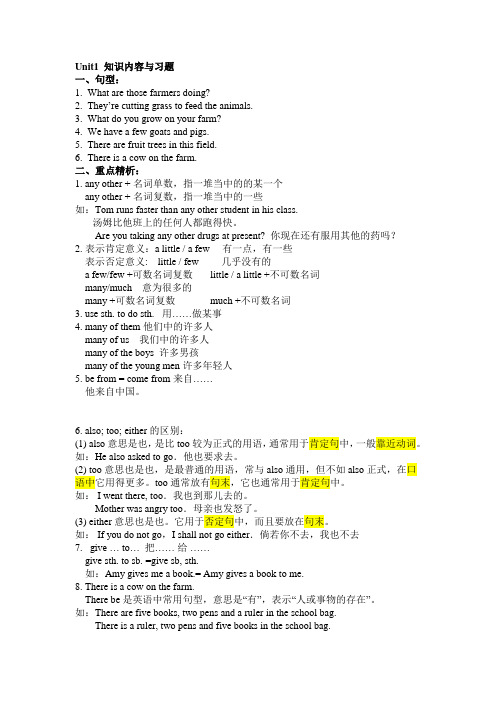
Unit1 知识内容与习题一、句型:1. What are those farmers doing?2. They’re cutting grass to feed the animals.3. What do you grow on your farm?4. We have a few goats and pigs.5. There are fruit trees in this field.6. There is a cow on the farm.二、重点精析:1. any other + 名词单数,指一堆当中的的某一个any other + 名词复数,指一堆当中的一些如:Tom runs faster than any other student in his class.汤姆比他班上的任何人都跑得快。
Are you taking any other drugs at present? 你现在还有服用其他的药吗?2. 表示肯定意义:a little / a few 有一点,有一些表示否定意义: little / few 几乎没有的a few/few +可数名词复数little / a little +不可数名词many/much 意为很多的many +可数名词复数much +不可数名词3. use sth. to do sth. 用……做某事4. many of them他们中的许多人many of us 我们中的许多人many of the boys 许多男孩many of the young men 许多年轻人5. be from = come from 来自……他来自中国。
____________________________________________________6. also; too; either 的区别:(1) also意思是也,是比too较为正式的用语,通常用于肯定句中,一般靠近动词。
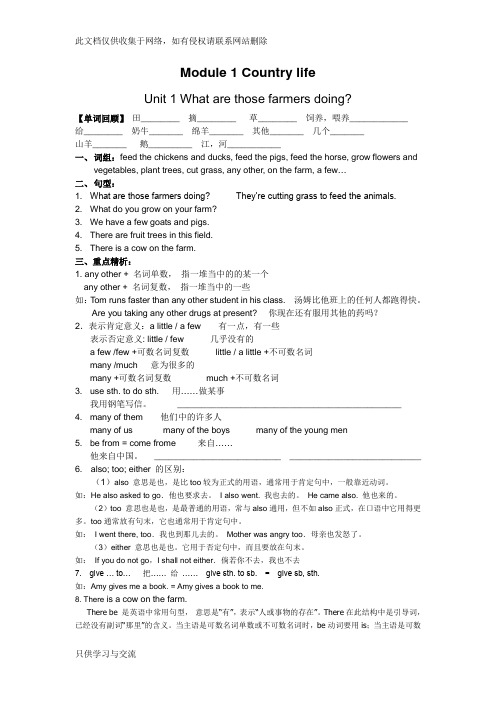
Module 1 Country lifeUnit 1 What are those farmers doing?【单词回顾】田________ 摘________ 草________ 饲养,喂养____________给________ 奶牛_______ 绵羊_______ 其他_______ 几个_______山羊_______ 鹅_________ 江,河___________一、词组:feed the chickens and ducks, feed the pigs, feed the horse, grow flowers andvegetables, plant trees, cut grass, any other, on the farm, a few…二、句型:1. What are those farmers doing? They’re cutting grass to feed the animals.2. What do you grow on your farm?3. We have a few goats and pigs.4. There are fruit trees in this field.5. There is a cow on the farm.三、重点精析:1. any other + 名词单数,指一堆当中的的某一个any other + 名词复数,指一堆当中的一些如:T om runs faster than any other student in his class. 汤姆比他班上的任何人都跑得快。
Are you taking any other drugs at present? 你现在还有服用其他的药吗?2.表示肯定意义:a little / a few 有一点,有一些表示否定意义: little / few 几乎没有的a few /few +可数名词复数little / a little +不可数名词many /much 意为很多的many +可数名词复数much +不可数名词3. use sth. to do sth. 用……做某事我用钢笔写信。

广州最新版六年级英语上册知识点及练习Module 1: Country LifeUnit 1: What Are Those Farmers Doing?In this unit。
we will learn some common XXX activities include feeding chickens。
ducks。
pigs。
and horses。
growing flowers and vegetables。
planting trees。
and cutting grass.We can use the following XXX activities:1.n: What are those farmers doing?Answer: They're XXX.2.n: What do you grow on your farm?Answer: We have a few goats and pigs.3.Sentence: XXX.4.Sentence: There is a cow on the farm.Here are some important points to keep in mind:1."Any other" + singular noun refers to one item from a group。
while "any other" + plural noun refers to some items from a group。
For example: Tom runs faster than any other student in his class。
Are you taking any other drugs at present?2."A little" or "a few" means some。
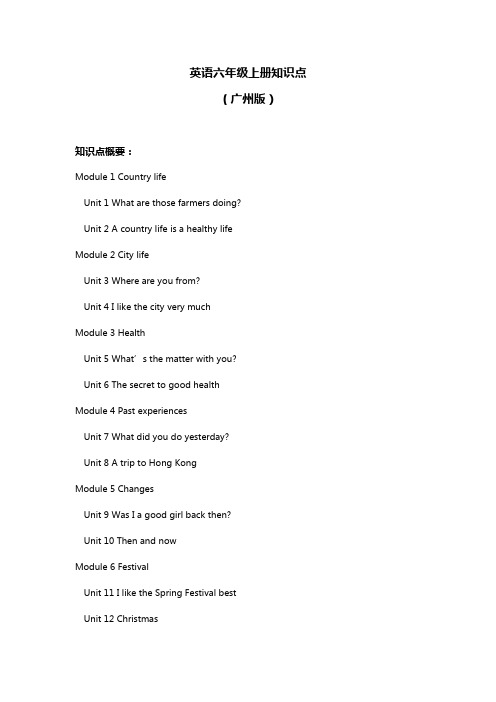
英语六年级上册知识点(广州版)知识点概要:Module 1 Country lifeUnit 1 What are those farmers doing?Unit 2 A country life is a healthy lifeModule 2 City lifeUnit 3 Where are you from?Unit 4 I like the city very muchModule 3 HealthUnit 5 What’s the matter with you?Unit 6 The secret to good healthModule 4 Past experiencesUnit 7 What did you do yesterday?Unit 8 A trip to Hong KongModule 5 ChangesUnit 9 Was I a good girl back then?Unit 10 Then and nowModule 6 FestivalUnit 11 I like the Spring Festival bestUnit 12 Christmas以下为详细内容▼Module 1 Country lifeUnit 1 What are those farmers doing?一、词组feed the chickens and ducks feed the pigs feed the horse grow flowers and vegetables plant trees cut grassany other on the farm a few…二、句型:1.What are those farmers doing?They’re cutting grass to feed the animals.2.What do you grow on your farm?3.We have a few goats and pigs.4.There are fruit trees in this field.5.There is a cow on the farm.三、重点精析:1. any other + 名词单数,指一堆当中的的某一个any other + 名词复数,指一堆当中的一些如:Tom runs faster than any other student in his class.汤姆比他班上的任何人都跑得快。
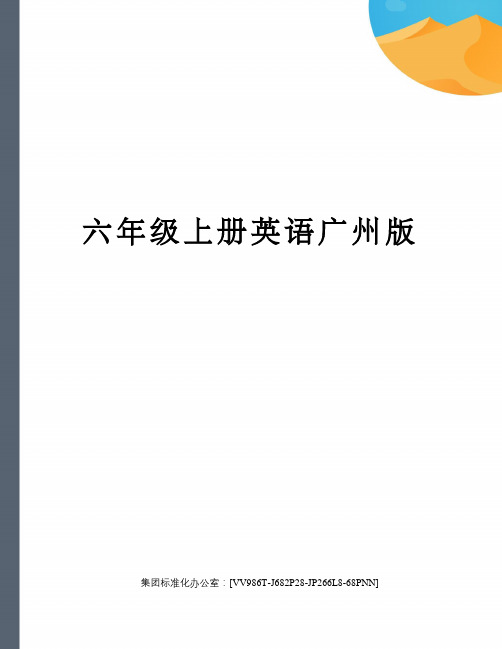
六年级上册英语广州版集团标准化办公室:[VV986T-J682P28-JP266L8-68PNN]1.重点语法:一般过去时2.频率的表达3.m a y,m a y b e与m a y b e的区别:may be是两个词,为情态动词may(可以,可能)+联系动词 be,意为”可能是”.maybe 是一个词,意为”也许”,为副词,通常放在句首,做状语,不可作表语.m a y是情态动词,"可以可能",m a y+动词原形如果后面有动词原形用m a y.4.I a m s o r r y t o h e a r t h a t.5.复习情态动词用“should”与“shouldn’t”来陈述句子,委婉表达主语该做或不该做的事情, 后面加动词原形。
同样用法的情态动词还有:m u s t,n e e d,c a n,c o u l d,m a y,m i g h t…6. ask sb to do sth: 叫某人做某事反义短语:ask sb not to do sth: t e l l s b(n o t)t o d o s t h告诉某人做某事7.w e l l: 1.副词,好地; 2.形容词,身体好g o o d:好的,只做形容词8.k e e p a g o o d d i e t. 保持一个良好的饮食习惯。
9.复习不规则形容词的比较级、最高级g o o d/w e l l—b e t t e r–b e s t,b a d/b a d l y—w o r s e—w o r s t m an y/m uc h—mo re—mos t, li tt le—l es s—le as t f ar—far th er—f ar the s t 10. 祈使句。
祈使句是用来表达命令、请求、劝告、警告、禁止等语气的句子。
肯定祈使句有以下几种类型:1)D o型----D o(表示行为的动词原形)+宾语+… S i t d o w n,p l e a s e.2)B e型----B e+名词/形容词+…B e q u i e t!3)Let型----Let+宾语(通常是第一或第三人称宾格)+动词原形+…Let’s go s h o p p i n g.第一人称,用l e t s b n o t d o s t h; 非第一人称,用d o n’t l e t s b d o s t h.否定祈使句有以下2种类型:1)D o n’t型----D o n’t+动词原形+…2)N o型----N o+名词或动词i n g形式.11.介词A.时间介词是用来表示时间的介词: 1)o n表示在具体的某一天或具体的某一天的上午、下午或晚上。
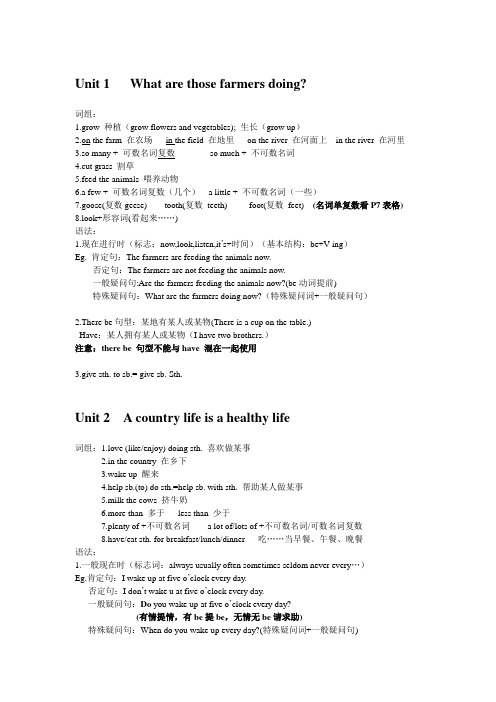
Unit 1 What are those farmers doing?词组:1.grow 种植(grow flowers and vegetables); 生长(grow up)2.on the farm 在农场in the field 在地里on the river 在河面上in the river 在河里3.so many + 可数名词复数so much + 不可数名词4.cut grass 割草5.feed the animals 喂养动物6.a few + 可数名词复数(几个) a little + 不可数名词(一些)7.goose(复数geese) tooth(复数teeth) foot(复数feet) (名词单复数看P7表格)8.look+形容词(看起来……)语法:1.现在进行时(标志:now,look,listen,it’s+时间)(基本结构:be+V-ing)Eg. 肯定句:The farmers are feeding the animals now.否定句:The farmers are not feeding the animals now.一般疑问句:Are the farmers feeding the animals now?(be动词提前)特殊疑问句:What are the farmers doing now?(特殊疑问词+一般疑问句)2.There be句型:某地有某人或某物(There is a cup on the table.)Have:某人拥有某人或某物(I have two brothers.)注意:there be 句型不能与have 混在一起使用3.give sth. to sb.= give sb. Sth.Unit 2 A country life is a healthy life词组:1.love (like/enjoy) doing sth. 喜欢做某事2.in the country 在乡下3.wake up 醒来4.help sb.(to) do sth.=help sb. with sth. 帮助某人做某事k the cows 挤牛奶6.more than 多于less than 少于7.plenty of +不可数名词 a lot of/lots of +不可数名词/可数名词复数8.have/eat sth. for breakfast/lunch/dinner 吃……当早餐、午餐、晚餐语法:1.一般现在时(标志词:always usually often sometimes seldom never every…)Eg.肯定句:I wake up at five o’clock every day.否定句:I don’t wake u at five o’clock every day.一般疑问句:Do you wake up at five o’clock every day?(有情提情,有be提be,无情无be请求助)特殊疑问句:When do you wake up every day?(特殊疑问词+一般疑问句)Unit 3 Where are you from?词组:1.Where are you from?=Where do you come from? 你来自哪里?2.be born出生(一般只用过去式)3.What’s …like?=What do/does …look like? ……怎么样?语法:1.注意各种场所,如buildings ,streets ,school, supermarket,hotel ,traffic,cinema,theater,park2.注意各种形容词,如tall/short, new/modern/old, wide/crowded, clean/dirty, heavy/thin, fast/slow,noisy/quiet,comfortable/uncomfortable3.人称的主格,宾格,所有格见P19Unit 4 I like the city very much词组:1.interested 感兴趣的(指人) interesting 有趣的(指事)2.A be different to/from B A不同于B3.The traffic is very heavy. 交通非常拥挤。
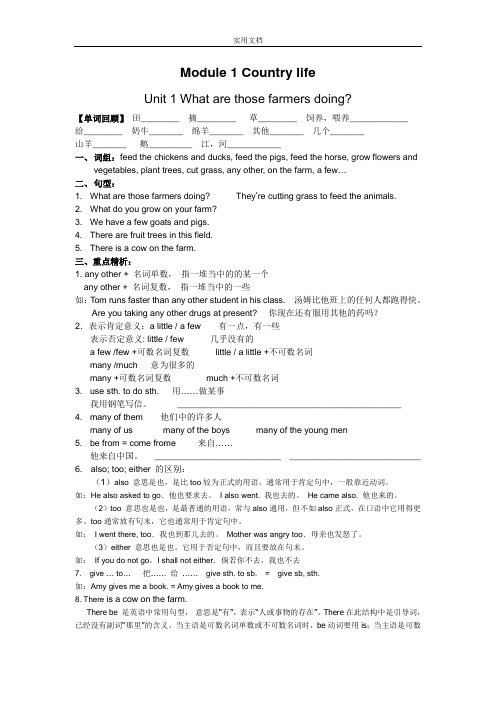
Module 1 Country lifeUnit 1 What are those farmers doing?【单词回顾】田________ 摘________ 草________ 饲养,喂养____________给________ 奶牛_______ 绵羊_______ 其他_______ 几个_______山羊_______ 鹅_________ 江,河___________一、词组:feed the chickens and ducks, feed the pigs, feed the horse, grow flowers andvegetables, plant trees, cut grass, any other, on the farm, a few…二、句型:1. What are those farmers doing? They’re cutting grass to feed the animals.2. What do you grow on your farm?3. We have a few goats and pigs.4. There are fruit trees in this field.5. There is a cow on the farm.三、重点精析:1. any other + 名词单数,指一堆当中的的某一个any other + 名词复数,指一堆当中的一些如:T om runs faster than any other student in his class. 汤姆比他班上的任何人都跑得快。
Are you taking any other drugs at present? 你现在还有服用其他的药吗?2.表示肯定意义:a little / a few 有一点,有一些表示否定意义: little / few 几乎没有的a few /few +可数名词复数little / a little +不可数名词many /much 意为很多的many +可数名词复数much +不可数名词3. use sth. to do sth. 用……做某事我用钢笔写信。
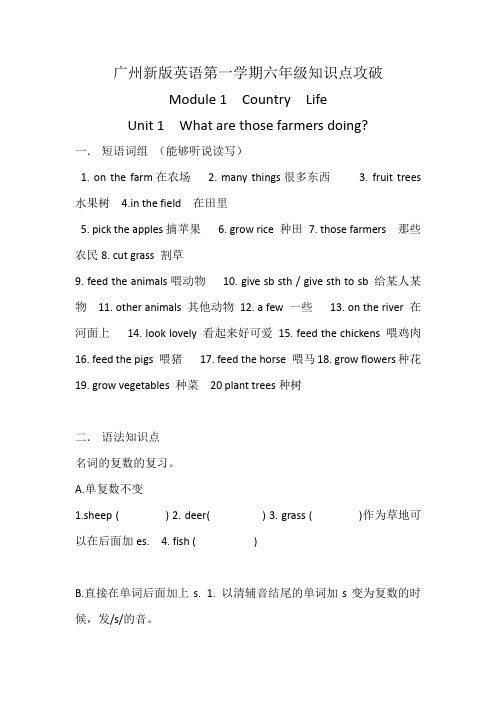
广州新版英语第一学期六年级知识点攻破Module 1 Country LifeUnit 1 What are those farmers doing?一.短语词组(能够听说读写)1. on the farm在农场2. many things很多东西3. fruit trees 水果树4.in the field 在田里5. pick the apples摘苹果6. grow rice 种田7. those farmers 那些农民8. cut grass 割草9. feed the animals喂动物10. give sb sth / give sth to sb 给某人某物11. other animals 其他动物12. a few 一些13. on the river 在河面上14. look lovely 看起来好可爱15. feed the chickens 喂鸡肉16. feed the pigs 喂猪17. feed the horse 喂马18. grow flowers种花19. grow vegetables 种菜20 plant trees种树二.语法知识点名词的复数的复习。
A.单复数不变1.sheep ( )2. deer( )3. grass ( )作为草地可以在后面加es.4. fish ( )B.直接在单词后面加上s. 1. 以清辅音结尾的单词加s变为复数的时候,发/s/的音。
1.book (books)2. shop( shops )3. cake (cakes)4. cliff (cliffs)2.以浊辅音结尾的单词加s变为复数的时候,后面的s 发音为/z/ 1.river (rivers ) 2. toy(toys )3. pig (pigs ) 4 . dog (dogs)C.以s , x, ch, sh 结尾的词加-es 读/iz/1.bus ( )2. box( )3. torch ( )4. brush( )D. 以辅音字母加y结尾的词去y改ies (注意不是辅音字母+y的词)1. factory (factories )2. study (studies )3. monkey(monkeys )4. play (plays)E. 以o结尾的单词,有生命的后面加es,没有生命的后面加s。

广州六年级上册各单元英语知识点归纳Module 1 Country lifeUnit 1 What are those farmers doing?一、词组:feed the chickens and ducks, feed the pigs, feed the horse, grow flowers and vegetables, plant trees, cut grass, any other, on the farm, a few…二、句型:1.What are those farmers doing? They’re cutting grass to feed the animals.2.What do you grow on your farm?3.We have a few goats and pigs.4.There are fruit trees in this field.5.There is a cow on the farm.三、重点语法:1. 名词单复数:2. any other + 名词单数,和any other + 名词复数,3.表示肯定意义:a little / a few 有一点,有一些表示否定意义: little / few 几乎没有的a few /few +可数名词复数little / a little +不可数名词many /much 意为很多的many +可数名词复数much +不可数名词4. use sth. to do sth. 用……做某事5. be from = come frome 来自……6. also; too; either 的区别:7. give … to… 把…… 给…… give sth. to sb. = give sb, sth.8. There be句型Unit 2 A country life is a healthy life一、词组:wake up, more than, plenty of, ride a bike, get home, at that time, thanks for, lots of…二、句型:1. A country life is a healthy life.2. It takes about 40 minutes.3. I am always very busy but I never feel tired, because I have plenty of exercise.4. When I get home after school, there is still much work to do.三、重点语法:1. live in + 大地点live at + 小地点(如街道、街区等)live on + 楼层2. help sb. (to) do sth. 帮助某人做某事help sb. with sth. 帮助某人做某事3. more than+数词超过,多于4. plenty of = a lot of = lots of + 可数名词复数/ 不可数名词表示许多、大量5. It takes about 40 minutes. 这大约要花二十分钟。
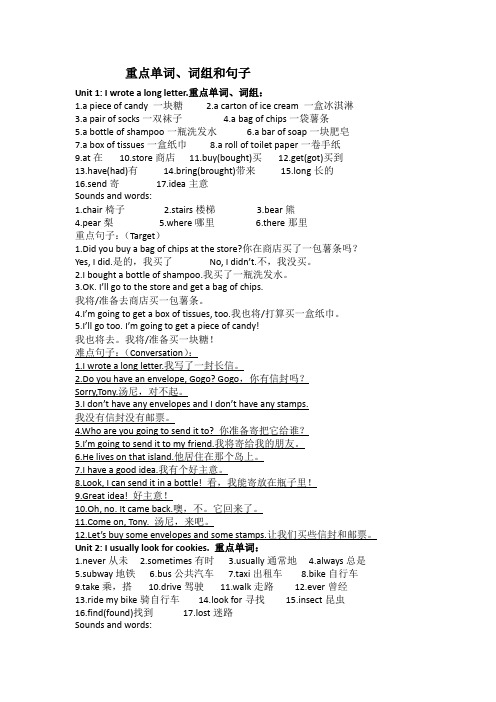
重点单词、词组和句子Unit 1: I wrote a long letter.重点单词、词组:1.a piece of candy 一块糖2.a carton of ice cream 一盒冰淇淋3.a pair of socks一双袜子4.a bag of chips一袋薯条5.a bottle of shampoo一瓶洗发水6.a bar of soap一块肥皂7.a box of tissues一盒纸巾8.a roll of toilet paper一卷手纸9.at在10.store商店11.buy(bought)买12.get(got)买到13.have(had)有14.bring(brought)带来15.long长的16.send寄17.idea主意Sounds and words:1.chair椅子2.stairs楼梯3.bear熊4.pear梨5.where哪里6.there那里重点句子:(Target)1.Did you buy a bag of chips at the store?你在商店买了一包薯条吗?Yes, I did.是的,我买了No, I didn’t.不,我没买。
2.I bought a bottle of shampoo.我买了一瓶洗发水。
3.OK. I’ll go to the s tore and get a bag of chips.我将/准备去商店买一包薯条。
4.I’m going to get a box of tissues, too.我也将/打算买一盒纸巾。
5.I’ll go too. I’m going to get a piece of candy!我也将去。
我将/准备买一块糖!难点句子:(Conversation):1.I wrote a long letter.我写了一封长信。
2.Do you have an envelope, Gogo? Gogo,你有信封吗?Sorry,Tony.汤尼,对不起。
![广州版小学六年级英语上册每单元要点[教材]](https://img.taocdn.com/s1/m/ae46d8501611cc7931b765ce0508763231127428.png)
广州版小学六年级英语上册每单元要点[教材] Module 1 PlansUnit 1 What Are We Going to Do for Our Holiday?一、单词双基a lot of 许多...... ?lot 许多 ?clothes 衣服 ?have fun 玩得开心 ?have been to 到过 ?instead 代替 ?plan 计划漫游;游弋 cruise 点心珍珠 dimsum pearl珠江庙 the Pearl River temple六榕寺味道好的;好吃的 the Six Banyan Temple yummy二、短语双基我们大家 1. all of us买新衣服 2. buy new clothes爬白云山 3. climb the Baiyun Hill读书 4. do some reading在广东酒家吃点心 5. eat dimsum at Guangdong restaurant好主意 6. good idea游珠江 7. go on the Pearl River Cruise在下九路购物 8. go shopping in Xiajiu Road广州艺术博物馆 9. Guangzhou Art Museum到过 10. have been to玩得很开心 11. have a lot of fun玩得开心 12. have fun吃午饭 13. have lunch多次 14. many times打牌 15. play cards学校假期 16. school holiday看白老虎 17. see white tiger上网 18. surf the Net照相 19. take photos珠江 20. the Pearl River六榕寺 21. the Six Banyan Temple香江野生动物园 22. Xiangjiang Zoo想要做某事 23. want to do sth.观鸟 24. watch birds写信 25. write a letter三、句型双基你打算干什么, 1. What are you going to do?我打算去爬白云山。
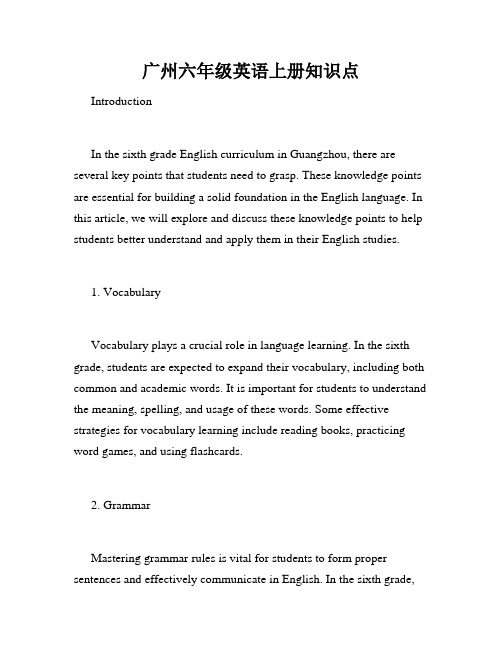
广州六年级英语上册知识点IntroductionIn the sixth grade English curriculum in Guangzhou, there are several key points that students need to grasp. These knowledge points are essential for building a solid foundation in the English language. In this article, we will explore and discuss these knowledge points to help students better understand and apply them in their English studies.1. VocabularyVocabulary plays a crucial role in language learning. In the sixth grade, students are expected to expand their vocabulary, including both common and academic words. It is important for students to understand the meaning, spelling, and usage of these words. Some effective strategies for vocabulary learning include reading books, practicing word games, and using flashcards.2. GrammarMastering grammar rules is vital for students to form proper sentences and effectively communicate in English. In the sixth grade,students focus on more complex sentence structures and tenses. They learn about the correct usage of articles, prepositions, conjunctions, and verb forms. Students should practice analyzing sentence structures and applying appropriate grammar rules in their writing and speaking.3. Reading ComprehensionTo improve reading comprehension, students are encouraged to read a wide variety of texts, including short stories, newspaper articles, and non-fiction books. They should develop the ability to understand the main idea of a text, identify supporting details, make inferences, and draw conclusions. Regular practice of reading and answering comprehension questions will enhance their reading skills.4. Writing SkillsWriting is an essential skill that allows students to express their thoughts and ideas effectively. In the sixth grade, students learn to write coherent paragraphs and short essays. They should focus on organizing their writing, using appropriate transition words, and maintaining a consistent point of view. Practice in writing different types of texts, such as narratives, descriptions, and persuasive essays, will help students develop their writing skills.5. Listening and SpeakingListening and speaking skills are fundamental in communication. Students should engage in various activities to enhance their listening and speaking abilities. These activities include listening to audio materials, watching videos with English subtitles, and participating in group discussions. By actively listening and expressing their thoughts orally, students can improve their communication skills and fluency in English.ConclusionIn conclusion, the knowledge points covered in the sixth grade English curriculum in Guangzhou are crucial for students to become proficient in the English language. By focusing on vocabulary, grammar, reading comprehension, writing skills, as well as listening and speaking abilities, students will develop a strong foundation for further English learning. It is essential for students to actively engage in practice and seek opportunities to apply these knowledge points in their daily lives. With consistent effort and dedication, students will achieve success in their English studies.。